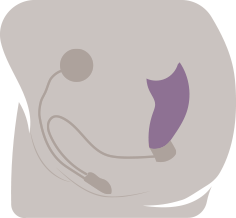Fecal Incontinence Surgical Treatments
Sacral Neuromodulation
Originally developed for the treatment of urinary incontinence and urinary frequency, sacral neuromodulation has also been proven to significantly help those suffering from bowel incontinence by gently stimulating the nerves controlling the bowel. The procedure takes place in an outpatient procedure in two phases.
The first phase allows the patient to test the therapy for one-to-two weeks. If significant improvement is documented, the second phase for long-term therapy is scheduled.
To determine if sacral neuromodulation is an effective therapy, a short testing period is required in which a small wire is placed under the skin near the tailbone during an outpatient procedure. The wire is connected to an external trial stimulator (worn temporarily near the lower back or hip) and sends mild electrical pulses to the nerves controlling bowel function. Patients are asked to document daily symptoms to determine if enough improvement is experienced to move forward with the long-term device.
If a patient and physician determine measured improvement, they become a candidate for long-term therapy. During the second outpatient procedure, a small implantable device is placed beneath the skin in the upper part of the buttock. The device mildly stimulates the pelvic nerves that assist in the communication between the brain and those muscles and nerves that control bowel function. This stimulation can be adjusted with the use of a small patient remote control.






